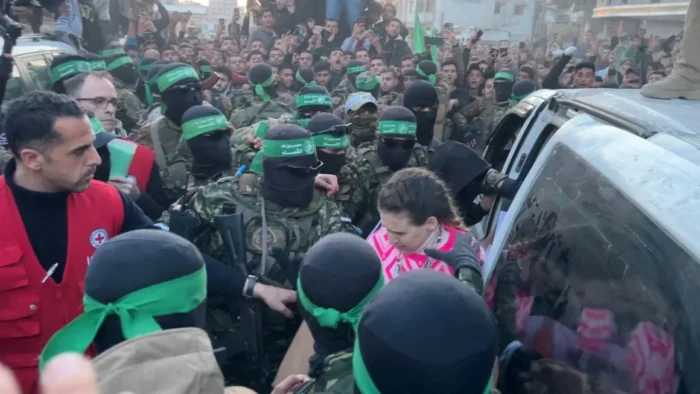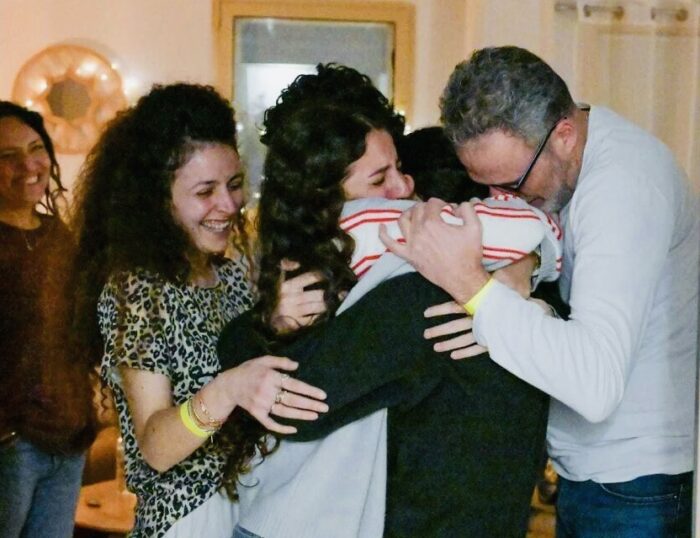A wave of elation and relief swept across Israel as a long-awaited ceasefire pausing Israel’s protracted war with Hamas took hold on January 19 and three Hamas hostages, Romi Gonen, Emily Damari and Doron Steinbrecher, were released after enduring 471 horrendous days of captivity in the Gaza Strip.
The celebratory mood was marred by an unsettling propaganda spectacle that unfolded in Gaza City before and after the hostages were handed over to the Red Cross by members of Hamas’ Izz a-Din al-Qassam Brigades.

As Gonen, Damari and Steinbrecher sat in the white van that brought them to the handover spot, a Hamas official gave them gift bags containing a “release certificate,” a map of Gaza, a pendant, and photographs of themselves in captivity. Heavily- armed Hamas gunmen in starched combat fatigues and black balaclavas, with green bandanas emblazoned with the Hamas logo tied around their heads, then escorted the women to a nearby Red Cross vehicle as crowds pressed toward them.
This brazen show of force conveyed an unmistakable message: Israel’s military campaign in Gaza has failed to dismantle or unseat Hamas, which carried out the terrorist attack in southwestern Israel on October 7, 2023. This atrocity resulted in the deaths of 1,200 Israelis and foreigners, the abduction of 251 people, and the eruption of the Israel-Hamas war.

Hamas’ narrative is clear. Despite its immense losses during the 15-month war with Israel, Hamas has survived, is still the dominant governing force in Gaza, and must be included in any political arrangement in the future. (Of late, Hamas has expressed a readiness to relinquish its role in civilian governance, but has insisted on retaining its military wing).
Its defiant message is aimed at demolishing Israel’s argument that Hamas’ military capabilities must be eradicated and that Hamas cannot be allowed to rule Gaza again.

Hamas’ public relations coup comes as no surprise. During the first, short-lived truce in November 2023, when 105 Israelis and foreigners were released in exchange for Palestinian prisoners, Hamas claimed that it had treated the hostages with care and consideration and that it was fully in control of Gaza.
Its carefully choreographed handover was a sham. Hostages reported that they had been subjected to torture, starvation, sexual violence, inhumane living conditions and psychological terror. And according to the Israeli army, several hostages were executed by their captors.
Of the 251 kidnapped hostages, 91 are still believed to be held in Gaza, including the bodies of at least 34 who were executed by Hamas or accidentally killed by Israel in air strikes. Still eight others have been rescued by Israeli troops, while the bodies of 40 have been recovered, including three mistakenly killed by Israeli soldiers as they tried to escape.
Under the six week ceasefire deal brokered this month by the United States, Qatar and Egypt, the next batch of hostages will be released next Saturday, when four more women are scheduled to be freed. In all, 33 hostages will be released in the first phase of the three-part agreement. All of them will be women, children, males over the age of 50, and sick or injured men. The majority are believed to be alive.
During the second stage, when Israel will be obliged to withdraw from Gaza and end the war, still more hostages will be let go.
Joe Biden, the former president of the United States, believes that the second phase should bring “a permanent end to the war.” The prime minister of Qatar, Mohammed bin Abdulrahman al-Thani, is hopeful that the truce will be “the last page of the war.” Donald Trump, the new U.S. president, has called the ceasefire “a first step toward lasting peace in the Middle East.”
Prime Minister Benjamin, however, is not as optimistic. He has labelled the ceasefire as “temporary” and said he has the “full backing” of the Trump administration to return to the battlefield should the second phase collapse in a welter of violations.“If we need to go back to the fighting, we will do so in new ways and with great force,” he said.
This scenario may well materialize. Since the outbreak of the war, Netanyahu has vowed he will not wind down the fighting until Hamas is soundly defeated, can no longer rule Gaza, and the very last hostage has been returned.
Judging by Hamas’ ostentatious public relations exercise in Gaza the other day, Israel is still a relatively long way off from achieving its just war aims.
Regrettably, this protracted war, already the longest in Israeli history, may last much longer than anticipated, jeopardizing the lives of the remaining hostages.

